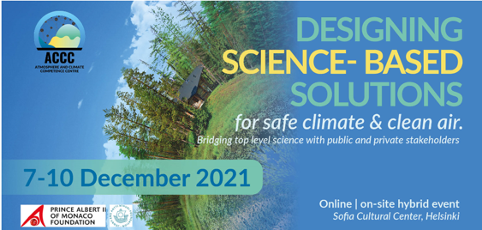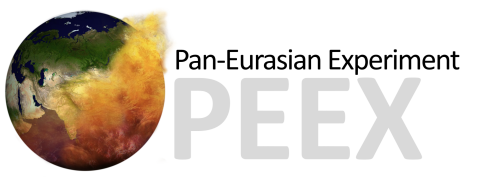Project Description

PEEX as an impact week co-organizer
Thank you for your participation in the ACCC ImpactWeek 7-10.Dec.2021. We had altogether 1412 participants from 37 countries in Europe, Asia, and North America, who followed our on-line event.
Daily highlights of the ACCC Impact Week:
- On Tuesday, 7th December 2021, Prof. Bert Holtslag received the first Sergej Zilitinkevich award as a part of the Zilitinkevich memorial seminar programme. New Sergej Zilitinkevich memorial award has been recently established by the Atmosphere and Climate Competence Center (ACCC), European Meteorological Society (EMS), Finnish Geophysical Society, Finnish Foundation for Aerosol Research (FAAR), International Eurasian Academy of Sciences (IEAS), National network Institute for Atmospheric and Earth system research (INAR Finland) and World Meteorological Organization (WMO) to honour the research by the Russian physicist Sergej Zilitinkevich (1936-2021). The Sergej Zilitinkevich memorial award is delivered annually to a creative scientist who has made breakthroughs in atmospheric sciences or oceanography. The Zilitinkevich memorial award acknowledges climate change, air quality research as fundamental assets in our route to find solution to Grand Challenges at the global scale. Furthermore, the joint International Eurasian Academy of Sciences (IEAS) meeting between Europe, Russia and China headquarters (HQ) was organized for the first time. All the HQ introduced their recent activities and future plans. Also three new IEAS Academicians – Prof. Sylvain Joffre, Finnish Meteorological Institute (Finland), Prof. Vito Vitale, National Research Council of Italy, Institute for Atmospheric Sciences and Climate (Italy), and Prof. Vladimir Katanaev, University of Geneva (Switzerland) and the Far Eastern Federal University (Russia) – introduced their research.
- On Wednesday, 8th December, we focused on the Green Transition and released the new “ACCC Innovation Forum”. The aim of this ACCC Innovation Forum is to detect, discuss and develop cooperation ideas with various partners. The Forum have several roles. It will connect new stakeholders to the ACCC cooperation, develop ideas from research to social, business and other innovations, facilitate concrete multi-stakeholder climate projects, enhance innovation processes related to atmospheric and climate sciences, promote awareness of climate sciences in other fields of society and business. In addition to key note presentations on the results of the “recent IPCC AR6 with emphasis on land carbon sequestration” and on the “Pathway to for reducing net emissions in Finland” we had moderated discussion with the ACCC Finnish stakeholders representing academic networks, public and private sectors as well as civil society organizations. In addition, international perspectives were given by the invited speakers – Valery Falkov, Minister, The Ministry of Science and Higher Education of the Russian Federation, Antti Kurvinen, Minister, Ministry of Education of Finland and Maria Cristina Russo, Director, Global Approach & International Cooperation, DG Research and Innovation, European Commission. The focus of the talks was on international research collaboration, targets of climate neutrality and, especially, on the monitoring systems. The Minister Valery Falkov emphasized Russia’s goal to achieve carbon neutrality by 2060. Russia has just launched a pilot project to establish Carbon Polygons and invites all interested countries and scientific organizations, including Finland, a long-term and good partner of Russia, to join this project and ensure the exchange of accumulated knowledge and experience (minobrnauki.gov.ru/press-center/news/?ELEMENT_ID=44816). The discussions on the future monitoring systems continued during the ACCC Global Observatory / Pan-Eurasian EXperiment (PEEX) online meeting, where new Russian Carbon Polygons, Black Sea SDG Observatory network were introduced in more details. Also, the Digital Belt and Road (DBAR) programme and Big Data issues were addressed by the International Research Center of Big Data for Sustainable Development Goals (SDGs).
- The 2nd ”Arena for the gap analysis of the existing Arctic Science Co-Operations (AASCO)” event was organized on 9 December, Thursday. The AASCO process was acknowledged by the President Tarja Halonen, Prince Albert II of Monaco, Petteri Taalas, Secretary General of the World Meteorological Organization (WMO) and Lars Kullerud, President of U-Arctic. The sustainable development of the Arctic regions under fast changing climate is built on science-based knowledge. During the last two years AASCO has build a network of Arctic researchers focusing the holistic process understanding of the Arctic and cold regions atmosphere – ocean – terrestrial ecosystems. The AASCO aims to bridge this research gap and identify the future research needs in this context. The current AASCO research network gathers together ca 100 arctic researchers. Furthermore, it as import to involve people living at the Arctic and the citizen science to the AASCO process. The next steps of the process for 2022, and beyond, will be planned in collaboration with the Prince Albert Foundation, U-Arctic and Arctic Council – Sustainable Arctic Observation Network (SAON).
- Friday 10th December marked the 4th Sofia Earth Forum by bringing together ecumenical approaches, decision-making perspectives and scientific research. The final day of the ACCC Impact Week focused on citizens’ engagement and civil society collaboration. The overall theme of this day was “safe climate”, partly drawn for the ACCC slogan safe climate and clean air. Speakers of the first session included Metropolitan Ambrosius (Orthodox Church of Finland), Archbishop Tapio Luoma (The Evangelical Lutheran Church of Finland), Juhani Damski (Permanent Secretary of the Ministry of the Environment of Finland), Anita Lehikoinen (Permanent Secretary of the Ministry of the Education of Finland), Kimmo Tiilikainen (Director General of the Geological Survey of Finland) and ACCC Director Academician, Prof. Markku Kulmala. Friday’s final session, a panel discussion on civil society, research and climate safety, was one of ACCC’s first public steps in establishing a stronger collaboration with civil society actors such as non-governmental organization (NGOs) and humanitarian actors. The panel brought together climate and sustainability experts and representatives of Finnish NGOs, including Saara Kankaanrinta (BSAG), Ada Segerstam (The Guides and Scouts of Finland), Taneli Saari (Ympäristöahdistuksen Mieli, Tunne ry), Heta Heiskanen (Finnish Ministry of the Environment), Sami Pirkkala (Finnish General Secretariat on Sustainable Development, Prime Minister’s Office) and Karoliina Pilli-Sihvola (Ministry of Agriculture and Forestry). The planning and co-designing of socially impactful activities will continue in 2022 to strengthen the link between research and civil engagement.
The presentations are available based on request, by e-mail to the accc-virtual-office(at)helsinki.fi
If you have not given us feedback yet, we appreciate if you take time to do so by filling a brief form: https://forms.gle/dAB5UPqMBq3eKqVQ6. We value your feedback and will use it to develop our events in the future!
The ACCC Impact Week was organized in collaboration with the Pan-Eurasian experiment Program (PEEX), International Eurasian Academy of Sciences (IEAS), Sofia Cultural Center, Finnish Ecumenical Network (SEN) and Climate Leadership Coalition (CLC).
Sponsors: Wihuri Foundation, Prince Albert Foundation Monaco
